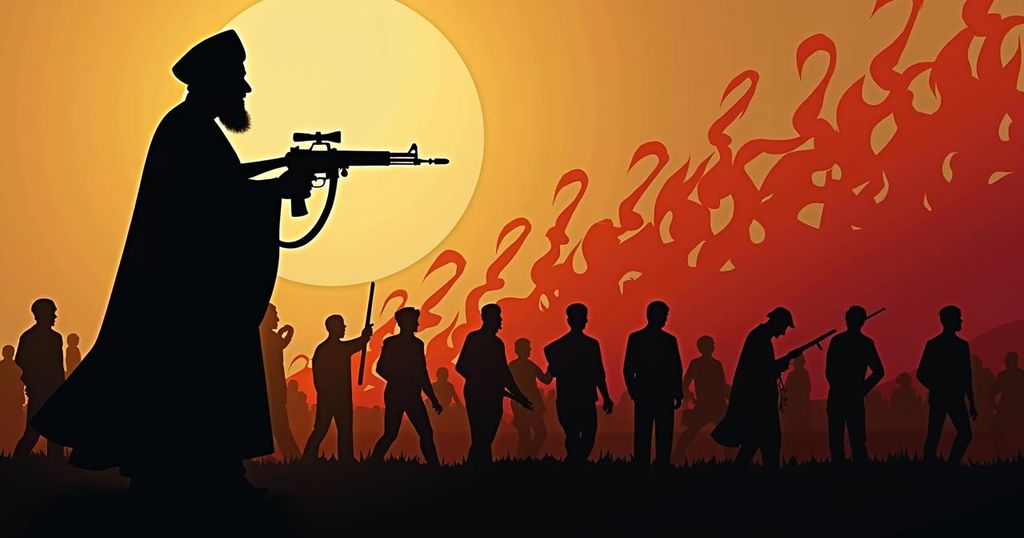Iranian supreme leader Ayatollah Ali Khamenei has vowed that the death of Hezbollah leader Hassan Nasrallah will “not go unavenged,” following his assassination by an Israeli airstrike. Khamenei announced a five-day mourning period, describing Nasrallah as a martyr whose ideological legacy endures. Concerns arise regarding potential escalations in regional conflict. Although Khamenei encouraged support for Hezbollah, he has not committed to immediate retaliation, reflecting Iran’s cautious stance amid rising tensions in the Middle East.
Iran’s supreme leader has declared that the assassination of Hezbollah leader Hassan Nasrallah will go unpunished, following his death from an Israeli airstrike in Lebanon. Ayatollah Ali Khamenei announced a period of five days of mourning in response to what he deemed the “martyrdom of the great Nasrallah,” emphasizing that Nasrallah represented a significant ideological path for Hezbollah and its supporters. Reports from Iranian media indicate that an Iranian Revolutionary Guards general was also killed in the same airstrike targeting a building in Beirut. Israel’s military offered justification for the airstrike by accusing Nasrallah of bearing “the blood of thousands… on his hands” and stated that he was involved in planning imminent assaults. This event has raised concerns that it may escalate tensions in a region already strained by ongoing conflicts, particularly following the deadly altercations that have ensued after the October 7 attacks and the warfare in Gaza. Key decisions by Ayatollah Khamenei will significantly influence future developments in the Middle East. To date, he and senior Iranian officials have refrained from publicly promising retaliation against Israel for its attacks on Hezbollah. This restraint appears to stem from Iran’s desire to avoid direct conflict with Israel, its longstanding adversary. Iran has likewise not executed retaliatory actions against Israel for the assassination of Hamas leader Ismail Haniyeh earlier this year. Currently, Khamenei has encouraged Muslims to support Hezbollah materially but has not explicitly vowed to retaliate for Nasrallah’s death. Khamenei asserted, “The fate of this region will be determined by the forces of resistance, with Hezbollah at the forefront.” In the aftermath of the airstrike, it has been reported that Khamenei has relocated for security and that Iranian officials maintain contact with Hezbollah and allied factions to strategize their next steps. The Israeli airstrike caused significant destruction in the Dahieh region of Beirut, believed to house Hezbollah’s central operations facility. Hezbollah confirmed Nasrallah’s passing but did not address Israeli claims regarding the deaths of other key commanders within the group, including Ali Karaki. It has been reported that Iranian General Abbas Nilforoushan was also killed in the assaults, although official confirmation remains pending. Iran provides substantial resources to Hezbollah through the Islamic Revolutionary Guard Corps (IRGC), thus enabling the group to establish a military presence that surpasses that of the Lebanese army. The United States has stated that the IRGC is integral in coordinating operations among Iran’s network of allied militant groups throughout the Middle East, which collectively identify as part of an “Axis of Resistance” opposing Israeli and U.S. interests.
This recent event marks a significant escalation in the ongoing hostilities between Israel and Hezbollah, with deep historical roots tied to Israel’s military actions in Lebanon and the wider regional dynamics influenced by Iran’s involvement in supporting various militant groups. The assassination of Hassan Nasrallah has triggered serious concerns about potential retaliatory measures not only from Hezbollah but also from Iran, and how this may impact the fragile stability of the Middle East. The ideological ties between Hezbollah and Iran are critical, as Hezbollah is recognized as a key ally of Iran in the region, further complicating the geopolitical landscape.
The assassination of Hassan Nasrallah, a pivotal figure in Hezbollah, poses significant implications for regional stability and security. As Iran seeks to navigate the complexities of this new reality without escalating into direct conflict with Israel, the future actions of Ayatollah Khamenei and the Iranian leadership will be crucial in determining the regional power dynamics. Amidst calls for resistance and support for Hezbollah, the response from Iran remains measured, reflecting a cautious approach that seeks to balance retaliation with the risk of wider conflict.
Original Source: www.bbc.com






